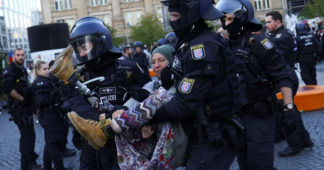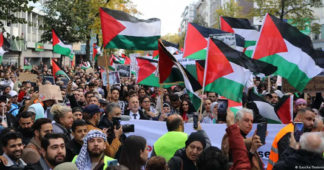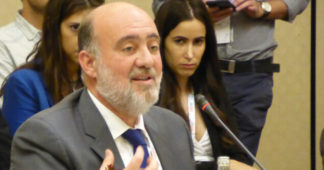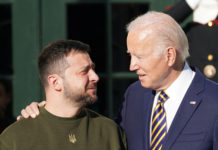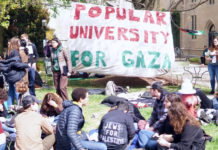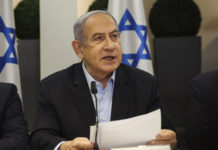A movement rooted in radical left opposition to the German state became a vehicle for claiming all Palestine solidarity is antisemitic.
by James Jackson*
11 December 2023
At a demonstration in the east German city of Leipzig in early November, the blue and white of the Israeli flag and the red and black flag of the antifa (anti-fascist) movement were seen flying together. Chants approved by the protest’s organisers included “no God, no state, no caliphate” but also “fight for Zionism”. A third chant identified this incongruous rally: “Nie wieder Deutschland” – never again Germany.
This demonstration was organised by the uniquely German political current known as the anti-Deutsch or anti-Germans – a movement rooted in radical left opposition to the German state, but nowadays defined primarily by its hardline solidarity with Israel and its critiques of any expression of solidarity with Palestine, anti-Americanism and even anti-capitalism as antisemitic.
Having spent years on the political sidelines associated with the far-left, the movement has now effectively achieved its pro-Israel political goals while dropping its leftist clothing. Their formerly radically Islamophobic views on the Israel-Palestine conflict have become mainstream as the country moves to criminalise support of Palestine as antisemitic after the recent flare-up in violence between Israel and Hamas.
“Anti-Germans were fringe weirdos who talked about Marxism and revolution, radical anticapitalist leftists waving Israeli flags,” Berlin-based Israeli researcher and activist Yossi Barthal told Novara Media. But with support for Israel becoming an ever more central part of German political life and support for Palestine increasingly marginalised since Hamas’ October 7 massacre, the anti-Germans have found new relevance. “They became incredibly mainstream – they are a very successful movement in that regard.”
‘Bomber Harris, do it again’
The anti-Deutsch movement broadly started as an attempt to oppose a resurgence of murderous German nationalism triggered by Germany’s reunification in 1990 according to Berlin-based sociologist Peter Ullrich. Speaking to Novara Media, he explained that the anti-Deutsch movement feared reunification would lead to a “fourth Reich.” They blamed something inherent in the German nation – whether culture or DNA – for having led to the Holocaust, and thought history would repeat itself if Germany was reunified and independent. One formerly anti-Deutsch thinker Jürgen Elsässer in 1990 demanded “the destruction of the German state and its […] replacement by a multi-ethnic state as well as the dissolution of the German people into a multicultural society.”
Some argued by pointing to the long history of German antisemitism, such as Martin Luther’s tract “On the Jews and their lies”, that Germans were intrinsically antisemitic, and so opposing antisemitism meant opposing Germany, being anti-Deutsch. But Germany’s Jews have never been seriously involved in the movement, which has been known to respond aggressively to the country’s Jewish anti-Zionists.
Their focus on Israel grew in part as a reaction to perceived antisemitism among other currents of the German radical left, such as the Red Army Faction and German collaborators with the Palestinian militant group Black September. But their Adorno and critical theory-influenced movement has increasingly focused on attacking Muslims and people who expressed any solidarity with Palestine as antisemites rather than criticising capitalism.
The anti-Germans were also opposed to remembering German civilians as victims in any way, later protesting vigils for the firebombing of Dresden by the allies during the second world war – a cause associated with German nationalists – and even praising the commander in chief responsible for allied bombing raids, chanting “Bomber Harris, do it again”.
So fanatically anti-nationalist was the group that they would go so far as to cancel concerts by bands that sing in minority languages such as Gaelic because they were perceived as ethno-nationalist. Yet the cornerstone of their political identity has always been supporting the Jewish state since the early 2000s.
Extreme tactics
It was after 9/11 and the second intifada that the anti-Deutsch really “started to focus more than ever on Muslims and Muslim countries and ‘discovered’ similarities between them and the Nazis”, Ullrich explains, often focusing on the historical Grand Mufti of Jerusalem Haj Amin al Husseini who collaborated with the Nazis.
Such extreme comparisons inevitably produced extreme tactics. Ullrich says the group sincerely “believes BDS and pro-Palestine movements are the new Nazis” because “Zionism is the only viable solution against antisemitism” and so “all means from the fight against Nazis are legitimate”, which they believe justifies their sometimes violent opposition to supporters of Palestine. In 2006, a domestic intelligence report on extremism agreed with this assessment, describing the anti-Deutsch’s “endorsement of all measures that appear suitable to secure the existence of the state of Israel as the only safe haven for Holocaust survivors”.
In late October a queer migrant housing co-operative in Leipzig that had hosted pro-Palestine events was attacked, its windows smashed and jars of what firefighters said was probably pig fat thrown inside. A now-deleted post later appeared on the German radical leftist forum linksunten.indymedia claiming responsibility for the attack: “Antifa means attacking antisemites”. That pig fat – chosen likely because the co-op’s inhabitants were associated with Islam due to their pro-Palestine stance – would also be deeply offensive to Jews and could be interpreted as antisemitic appears to have escaped the attackers – a sign at the very least of their ignorance of Judaism. The incident was mostly ignored by the public at large.
A ‘hate movement’
Gradually the extremism of the anti-Deutsch caught up with them. In 2015, the German federal centre for political education – a quasigovernmental body that educates the public on politics and fights extremism – found that the Anti-Deutsch’s pro-Israel politics had “congealed into a certain obsession” with “Muslim gangs”- a bête noire of Germany’s conservative parties like the Christian Democrats.
“Anti-Muslim racism got really into them in the 2000s and [they] became an extreme hate movement in parts,” says Bartal. “A lot of what the anti-Germans say are rightwing talking points in other countries.” Many parts of the movement, such as the magazine Konkret, supported the invasion of Iraq, backing an American bulwark that could protect Israel (you’ll sometimes see American flags on anti-Deutsch demos).
“The more I get to know the anti-Deutsche,” Leipzig-based Israeli activist Michael Sappir told the American-Jewish magazine Jewish Currents, “the more I see that they’re only culturally part of the left; their politics are not anymore.” But the cultural side is significant, particularly in the German club scene. In 2018, venue About Blank cancelled an event after a DJ used the hashtag #DJsforPalestine, which the club described as “structural antisemitism.” A more extreme anti-Muslim wing of anti-Deustch is involved in running Leipzig’s Conne Island – a club that has banned Palestinian keffiyeh scarves – and in 2018 even invited self-described “Islam-hater” Thomas Maul, a supporter of the far-right Alternative for Germany (AfD) party, to speak about “Islamic antisemitism”.
After 7 October
Since Israel’s counter-attack on Gaza, Germany has seen dozens of large pro-Palestine protests, despite an ongoing legal crackdown on Palestine solidarity which started when Nakba day protests were banned after Shireen Abu Akleh’s assassination last year. Even in Leipzig, the stronghold of the anti-German movement, a pro-Palestine protest got a noticeably bigger turnout than the city’s pro-Israel demonstration.
Does this mean the anti-Deutsch has lost influence? As a leftist group, yes, but as a movement, no. Their radically anti-Palestinian and anti-Muslim politics have become so mainstream as to make themselves unnecessary, with leading centre-left politicians like Germany’s president, vice-chancellor and interior minister all calling on Muslims or Arabs as a whole to distance themselves from Hamas.
Ullrich explains that while it is increasingly rare to find people who identify as anti-German, “much of what they do has diffused into general leftwing discourse or even society at large. People are now intuitively pro-Israel because they think that is opposing antisemitism and because it became part of leftwing (youth) culture.” It has effectively become German identity politics, he says, pointing to Germany’s largest trade union’s youth group posing with an Israeli flag to show that they oppose antisemitism.
Many figures who previously wrote for anti-Deutsch publications have gone on to become fixtures of German public life: take Berlin’s antisemitism commissioner Samuel Salzborn, who cut his teeth writing for the anti-Deutsch blog Bahamas, or author Deniz Yücel, a former contributor to anti-Deutsch newspaper Jungle World who is now a columnist for the conservative broadsheet Welt. Meanwhile, many of the founders of the Ruhrbarone blog – which tweeted that Gaza should be destroyed in 2018 – have gone on to respectable careers in the media, with one even serving as an MP for the neoliberal Free Democrat party.
“Some of their ideological characteristics resonate with the general discourse – that allows them to be invited to forums. If you are anti-German it is more likely you might enter respectable society than other leftwing activists,” Ulrich explains.
Some figures have even broken the final taboo and praised Germany. “Now you can read again that Germany will isolate itself if it doesn’t join in with the global hatred of Israel and the country’s standing in science and culture will suffer as a result. What stands behind that: Jews don’t count” wrote a contributor to Judenhass Underground, a book that complained about the club scene’s supposed antisemitism. In a dialectical transformation worthy of the Frankfurt school, the anti-Germans critical of the left have synthesised with the patriotic German establishment. What has that created? Chaos.
* James Jackson is a freelance journalist based in Germany.
We remind our readers that publication of articles on our site does not mean that we agree with what is written. Our policy is to publish anything which we consider of interest, so as to assist our readers in forming their opinions. Sometimes we even publish articles with which we totally disagree, since we believe it is important for our readers to be informed on as wide a spectrum of views as possible.

